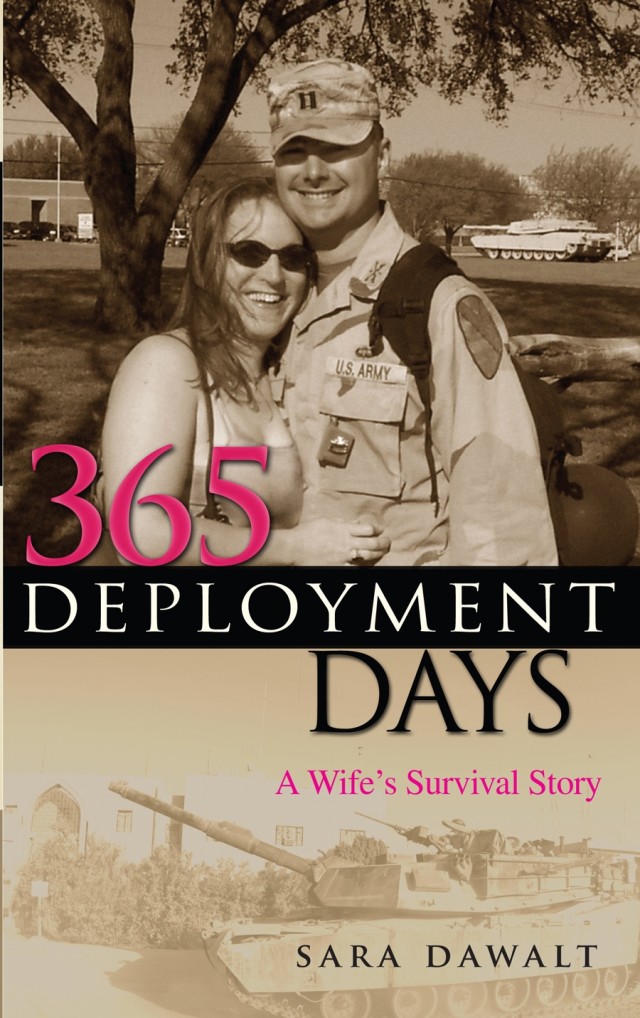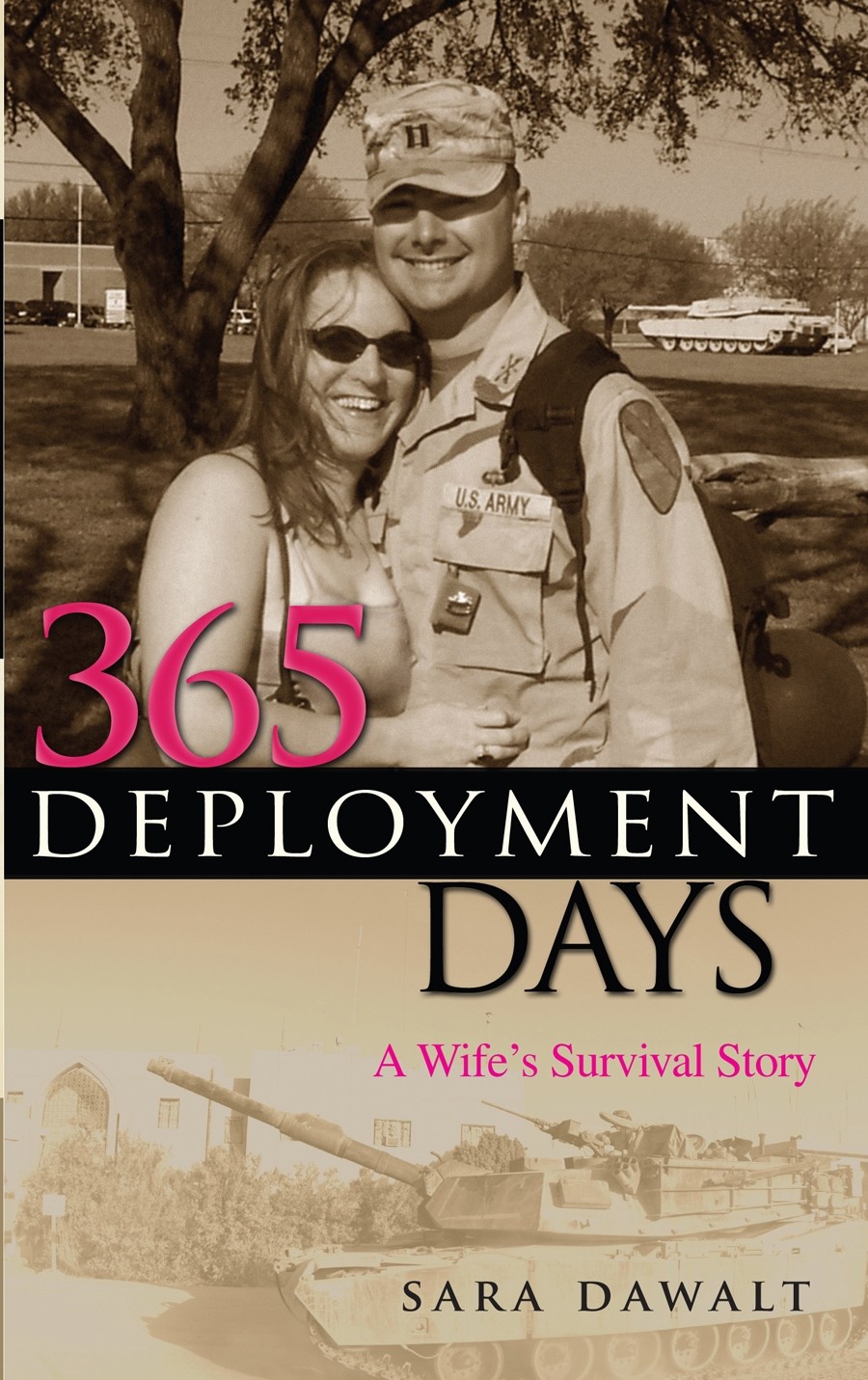WASHINGTON (Army News Service, Jan. 30, 2008) - When Soldiers march off to war, so do their spouses, writes one Army wife in her new book. They fight to stay connected with their Soldiers across miles and distance, and to survive on their own.
In "365 Deployment Days: A Wife's Survival Story," Sara Dawalt chronicles the loneliness, anger and worry that nearly destroyed her marriage while her husband Brandon, a captain, was deployed with Fort Hood's 1st Cavalry Division in 2004, and her eventual triumph over it all.
Dawalt wrote the book to help people and it's a useful handbook for spouses and Soldiers on the emotions to expect, what to do and what not to do. Civilians should read it too, she said, so they understand what military Families go through.
"The husbands need to read this book, or the wives, whoever is the Soldier, so they understand what their spouse is going through, because Brandon had no idea. I think a lot of times the guys get over there and it's easy for them to compartmentalize their lives and if they don't call or they don't email, it's easier for them to focus on what they're doing and forget that they're where they are. It's going to take husbands and wives communicating and really really talking to figure out what they can do for each other to make it through it," she said in an interview.
She knew her husband would eventually deploy after Sept. 11, 2001, and after he received his orders to deploy in March 2004, she began to withdraw and argue with him about little things.
"On more than one occasion, I shouted at him 'Just go!' Of course I didn't want him to go, but knowing it was out there and drawing nearer every day was swallowing me alive. The only way I found to express my frustration was to scream," she wrote.
Dawalt described barely being able to handle waiting with her husband for their final goodbye when the departure date arrived. At one point she almost went home because she couldn't bear it any longer. But after his unit left, the loneliness was crushing.
"I was alone," she wrote. "Totally, completely, and utterly alone, and there was nothing I could do about it...I felt the overwhelming urge to talk to someone, anyone, to decompress and rant about the unbelievable night I had just experienced. I felt so many emotions that I thought I was going to explode, but who do you call at four in the morning' No one I knew...Instead, I huddled up with my dog, cried, and tried to sleep."
Dawalt provides a window into her daily life during the deployment: her daily jumbo of emotions, her erratic sleep schedule, the healing power of exercise, retail therapy and the sanity-saving companionship of her dog.
Her life became about the deployment, and not only because of her worry and loss. She couldn't watch the news. Friends she hadn't heard from in years called to check up on her, but most people wanted to know about her husband. If they remembered to ask how she was doing, it was usually an afterthought.
"Of course, they should ask about him and be concerned about him, but I really felt like I was just disappearing in his deployment. I was like, 'Hey, I'm a person too.' So I'm hoping that by reading, more and more people will start to understand. I think that's the biggest thing. People need to know to ask about the person who's still here, trying to hold the life together," she said.
However painful life is, Dawalt warns spouses against shutting themselves in. A support network is crucial, she said, and spouses should spend time with their friends and doing activities they enjoy. Nor should spouses be afraid to take vacations on their own or with battle buddies, or plan trips after their spouses' return. It will make the time go faster, she said.
But husbands and wives have to find ways to stay connected, she said. Her new-found independence came with a price as instant messaging and web cameras, interspersed with a couple calls a month, were not enough communication for her.
As the months stretched out, she realized that she felt less and less like a wife. She still loved her husband, but she couldn't cope. She didn't want to talk about her feelings because she didn't want to worry him or distract him while he was in combat.
"It's really hard to reconcile," she said. "You feel like you're being pulled in two different directions. You want your independence and you like your independence. You're part of a married couple, but you're not because he's not physically there. It was very hard for me and that's when I started reflecting on myself and my life and realizing I couldn't wait for him for my life to start.
"That was the worst part, feeling totally disconnected from him. Being married, that wasn't something I ever thought I would experience."
She was so afraid she would let her feelings show, she barely wanted her husband to come home for rest and relaxation. When she finally did break down, right before he returned to Iraq, she said it was the best thing that could have happened to her marriage. She and her husband talked honestly and he understood how hard life was on the homefront. They found ways to talk regularly for the rest of his deployment, and talked almost daily during his second deployment, which just ended.
"My husband has volunteered to be a hero every day, and I couldn't be prouder of him. The bad, of course, is our time apart and the danger of deployment. The best parties that the adversity the Army has added to our life has strengthened my knowledge of myself and my marriage to the point that both are rock solid," she wrote.


Social Sharing